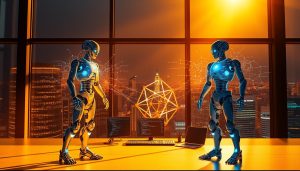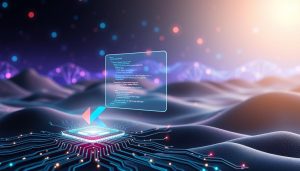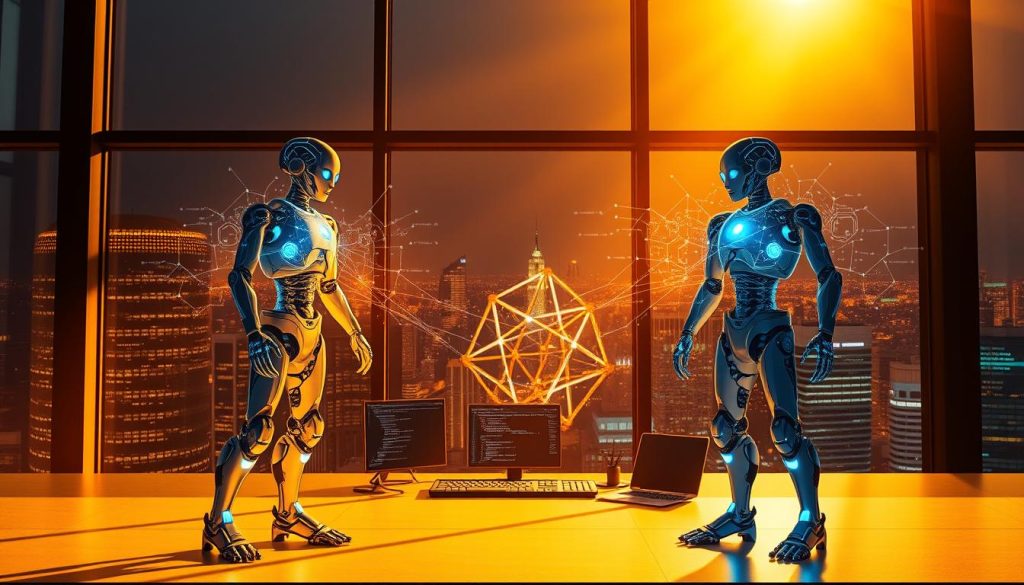The Dark Side of AI Coding: Will Devs Lose Jobs in 2025?
As AI coding becomes increasingly prevalent, concerns about the future of coding jobs are growing. Will developers lose their jobs to automation by 2025?
The integration of AI in software development is transforming the industry, raising questions about the potential impact on the workforce. While AI brings numerous benefits, such as increased efficiency and accuracy, it also poses a threat to certain job roles.

The concern is not just about developers job loss but also about the need for developers to adapt to new technologies and workflows. As AI continues to evolve, it’s essential to consider the implications for the industry and the professionals within it.
Key Takeaways
- The rise of AI coding is transforming the software development industry.
- Concerns about developers job loss are growing as AI becomes more prevalent.
- AI in software development brings both benefits and challenges.
- The future of coding jobs will depend on the ability to adapt to new technologies.
- Developers must be prepared to evolve alongside AI advancements.
The Evolution of AI in Software Development
The integration of AI in software development has revolutionized the way developers work, making processes more efficient and streamlined. This evolution is marked by significant advancements in AI coding tools and their increasing adoption across the tech industry.
Current AI Coding Tools and Their Capabilities
AI coding tools have become indispensable for many developers, offering a range of functionalities that simplify the coding process. GitHub Copilot and similar assistants are at the forefront of this trend, providing real-time code suggestions and automating routine tasks.
GitHub Copilot and Similar Assistants
Tools like GitHub Copilot are powered by advanced AI models that can understand and generate code snippets based on the context. This capability not only speeds up development but also helps reduce errors.
Large Language Models in Development
Large language models are playing an increasingly important role in software development, enabling applications such as code completion, bug detection, and even project documentation generation. Their integration into development workflows is enhancing productivity and code quality.
Adoption Rates Among Tech Companies
The adoption of AI coding tools is on the rise across the tech industry, with both Fortune 500 companies and startups leveraging these technologies to stay competitive.
Fortune500 Implementation Statistics
Recent statistics show that a significant percentage of Fortune 500 companies are now using AI-driven coding tools, with over 70% reporting improved development efficiency.
Startup Integration Trends
Startups are also embracing AI coding tools, with many integrating them into their development processes from the outset. This trend is expected to continue, driving innovation and competitiveness in the tech sector.
Understanding the Threat: How AI Is Transforming Coding Practices
The integration of AI in coding is not just a trend; it’s a seismic shift that is altering the landscape of software development. As AI continues to evolve, it’s crucial to understand how it’s transforming coding practices, particularly in areas such as code generation versus human programming and speed and efficiency metrics.
Code Generation vs. Human Programming
The debate between code generation and human programming is central to understanding AI’s impact on coding. While AI can generate code quickly and efficiently, human programmers bring creativity and problem-solving skills to the table.
Quality Comparisons
AI-generated code is often compared to human-written code in terms of quality. While AI has made significant strides, human code still holds an edge in complex projects. For instance:
- AI excels in repetitive, mundane tasks.
- Humans outperform AI in tasks requiring creativity and nuance.
Creativity Differences
Creativity is another area where human programmers excel. AI can process and analyze vast amounts of data, but it lacks the human touch when it comes to innovative solutions.
Speed and Efficiency Metrics
One of the most significant advantages of AI in coding is its ability to improve speed and efficiency. This is evident in two key areas:
Development Time Reduction
AI tools can automate routine tasks, significantly reducing development time. This allows developers to focus on more complex issues.
Cost Savings Analysis
By reducing development time and improving efficiency, AI can lead to substantial cost savings for businesses. According to recent studies, companies adopting AI coding tools have seen a notable decrease in development costs.
In conclusion, AI is transforming coding practices in profound ways, from code generation to speed and efficiency metrics. Understanding these changes is crucial for developers and businesses alike to navigate the evolving landscape of software development.
Jobs Already Being Displaced by AI
The rise of AI in software development is already affecting certain job roles. As AI technologies become more sophisticated, their impact on the development community is becoming more pronounced.
Entry-Level Development Positions
Entry-level positions are among the first to be impacted by AI-driven automation. Junior developers, in particular, face significant changes as AI tools begin to handle more routine coding tasks.
Junior Developer Impact
Junior developers are finding that their initial tasks are being automated, requiring them to adapt quickly to more complex tasks that AI cannot handle. This shift demands a higher level of skill and understanding from the outset.
Internship Transformation
Internships are also undergoing a transformation. Companies are now looking for interns who can work alongside AI tools, understanding how to leverage these technologies effectively.
Routine Coding Tasks Automation
AI is automating routine coding tasks, significantly impacting areas such as testing, QA, and documentation generation.
Testing and QA Changes
Testing and QA roles are evolving as AI takes over repetitive testing tasks, allowing human testers to focus on more complex scenarios.
Documentation Generation
AI-driven documentation generation is becoming more prevalent, reducing the need for manual documentation efforts.
The Dark Side of AI Coding: Will Devs Lose Jobs in 2025?
As AI continues to advance, the question on every developer’s mind is: will AI coding advancements lead to job losses by 2025? The impact of AI on the development community is a topic of much debate, with some experts predicting significant job displacement, while others believe AI will augment human capabilities, leading to new opportunities.
Industry Predictions and Trends
Industry experts are divided on the impact of AI on developer jobs. Some predict that AI will automate routine tasks, freeing developers to focus on more complex problems. Others warn that AI could replace certain roles entirely.
Expert Forecasts
According to a report by Gartner, by 2025, 30% of new enterprise applications will be developed using AI-powered tools. Forrester predicts that AI will lead to a 10% reduction in developer jobs in the next five years.
Technology Timeline Projections
The timeline for AI adoption in software development is accelerating. GitHub Copilot, an AI-powered code completion tool, has already seen widespread adoption. As AI technology improves, we can expect to see more sophisticated tools emerge.
Job Market Analysis for Developers
The job market for developers is expected to undergo significant changes due to AI. Understanding hiring trends and salary impacts will be crucial for developers looking to future-proof their careers.
Hiring Trend Data
| Year | Demand for Developers | AI Impact on Hiring |
|---|---|---|
| 2023 | High | Minimal |
| 2025 | Moderate | Moderate |
| 2030 | Low | Significant |
Salary Impact Predictions
As AI changes the landscape of software development, salaries for developers may be impacted. While some predict salary increases due to productivity gains, others warn of potential decreases as AI reduces the need for human developers.
Which Developer Specializations Face the Highest Risk?
As AI continues to evolve, certain developer roles are facing heightened vulnerability. The tech industry is witnessing a significant transformation, with AI’s impact being felt across various developer specializations.
Front-End Development Vulnerability
Front-end development, which focuses on creating user interfaces and user experiences, is particularly susceptible to AI-driven changes. Two key areas where this vulnerability is evident are:
UI Component Generation
AI tools are increasingly capable of generating UI components, potentially reducing the need for manual coding in this area. This shift could impact developers specializing in front-end development.
Template-Based Development
The rise of template-based development, facilitated by AI, allows for quicker and more efficient creation of front-end elements. While this boosts productivity, it also poses a risk to developers whose work is heavily based on template customization.
Back-End Development Challenges
Back-end development, which involves server-side logic, database integration, and API connectivity, is also facing challenges due to AI. Key areas include:
API Creation Automation
AI is being used to automate API creation, simplifying the process of connecting different software systems. This automation could affect developers who specialize in API development.
Database Management Changes
Advances in AI are also influencing database management, with AI-driven tools enhancing data modeling, querying, and optimization. While these advancements improve efficiency, they may impact certain back-end development roles.
Mobile App Development Transformation
Mobile app development is undergoing a significant transformation due to AI, with impacts seen in:
Cross-Platform Solutions
The development of cross-platform solutions is being revolutionized by AI, enabling developers to create apps that run seamlessly across multiple platforms. This shift is changing the landscape for mobile app developers.
App Generation Tools
AI-powered app generation tools are emerging, allowing for the rapid creation of mobile applications with minimal manual coding. This trend poses both opportunities and challenges for mobile app developers.
| Developer Specialization | AI Impact | Potential Risk |
|---|---|---|
| Front-End Development | UI Component Generation, Template-Based Development | High |
| Back-End Development | API Creation Automation, Database Management Changes | Medium |
| Mobile App Development | Cross-Platform Solutions, App Generation Tools | High |
Skills That Remain Uniquely Human in Development
As AI continues to advance, the value of human skills in software development becomes increasingly apparent. While AI can process vast amounts of data and perform repetitive tasks with precision, there are certain aspects of development that require a human touch.
Complex Problem-Solving and Architecture
Complex problem-solving is a critical skill that remains uniquely human. Developers need to design systems that are not only efficient but also scalable and secure.
System Design Expertise
System design expertise involves understanding the intricacies of software architecture, including the ability to anticipate potential bottlenecks and design solutions that are both robust and flexible.
Performance Optimization
Performance optimization requires a deep understanding of how different components of a system interact, a skill that is honed through experience and human intuition.
Human-Centered Design Thinking
Human-centered design thinking is another area where human skills shine. This approach prioritizes the needs and experiences of the end-user, leading to more intuitive and user-friendly products.
User Experience Insights
Understanding user experience insights allows developers to create products that meet the needs of their target audience, a task that requires empathy and a deep understanding of human behavior.
Ethical Implementation Decisions
Ethical implementation decisions are also crucial, as developers must consider the broader societal implications of their work, ensuring that their creations are not only functional but also ethical and responsible.
Key human skills in development include:
- Complex problem-solving: The ability to tackle complex issues that AI may struggle with.
- Human-centered design thinking: Prioritizing user needs and experiences.
- System design expertise: Crafting robust and scalable system architectures.
- Ethical decision-making: Ensuring that technological advancements are aligned with human values.

Economic Ripple Effects Across the Tech Industry
The economic ripple effects of AI in the tech industry are complex and multifaceted, influencing various aspects of business operations.
Changing Business Models and Team Structures
The adoption of AI is leading to a shift in business models, with companies increasingly relying on AI-driven solutions. This, in turn, is affecting team structures, as the need for AI-savvy personnel grows.
Developer-to-AI Ratio Shifts
As AI becomes more integrated into development processes, the ratio of developers to AI tools is expected to shift, potentially leading to more efficient project execution.
New Organizational Hierarchies
New hierarchies may emerge, with AI management and oversight becoming critical components of organizational structures.
Cost Savings vs. Innovation Concerns
While AI adoption can lead to significant cost savings in the short term, there are concerns about its long-term impact on innovation.
Short-Term Benefits
In the short term, AI can help reduce operational costs by automating routine tasks.
Long-Term Consequences
However, over-reliance on AI might stifle innovation if not managed carefully, potentially leading to stagnation in the long run.
| Aspect | Short-Term Impact | Long-Term Impact |
|---|---|---|
| Cost Savings | Significant reduction in operational costs | Potential for decreased innovation investment |
| Innovation | Initial boost due to AI-assisted development | Risk of stagnation if over-reliance on AI |
| Team Structure | Shift towards more AI-savvy personnel | Emergence of new organizational hierarchies |
Developer Community Reactions: Survey Insights
Survey insights reveal a complex picture of how developers are reacting to AI’s growing presence in their field.
Current Workforce Perspectives
Developers are adapting to AI in various ways, with some embracing its potential while others express concern.
Job Security Concerns
Many developers worry about job security as AI assumes routine coding tasks. A survey found that 60% of developers believe AI could significantly impact their job roles.
Adaptation Strategies
To stay relevant, developers are focusing on skills that complement AI, such as complex problem-solving and human-centered design thinking.
Generational Differences in AI Acceptance
The acceptance of AI varies among different generations of developers.
Early-Career vs. Veteran Developers
Early-career developers tend to be more open to AI, seeing it as a tool to enhance their productivity. In contrast, veteran developers are more cautious, often having established their careers and workflows.
Educational Background Factors
Developers with a background in computer science are more likely to understand and adapt to AI technologies. Those from other educational backgrounds may require additional training.
The developer community’s reaction to AI is multifaceted, reflecting a range of concerns and opportunities.
- Job security concerns are prevalent among developers.
- Adaptation strategies focus on complementing AI with human skills.
- Generational differences influence AI acceptance.
Adaptation Strategies: Future-Proofing Your Development Career
To future-proof their careers, developers need to focus on skills that complement AI. As AI continues to evolve, it’s crucial for developers to adapt and acquire new skills that work in tandem with AI tools.

AI Collaboration and Prompt Engineering Skills
Effective collaboration with AI requires developers to understand how to use AI tools efficiently. This involves prompt engineering, where developers learn to craft inputs that elicit the most accurate and relevant outputs from AI systems.
Effective AI Tool Usage
Developers must become proficient in using AI tools to augment their work. This includes understanding the strengths and limitations of various AI coding assistants.
Human-AI Workflow Optimization
Optimizing workflows to integrate AI effectively is key. This means identifying tasks where AI can assist and streamlining processes to maximize productivity.
Specialization vs. Versatility Debate
The debate between specializing in a niche area versus being versatile across multiple domains is ongoing. Developers need to consider their career goals when deciding between these paths.
Niche Expertise Development
Developing niche expertise can make developers invaluable in specific areas where AI is less capable.
Cross-Functional Skill Building
On the other hand, building cross-functional skills allows developers to adapt to various roles and projects, making them more versatile.
Continuous Learning Frameworks
Continuous learning is essential for staying relevant. Developers should engage with various educational resources and certification pathways to enhance their skills.
Educational Resources
Utilizing online courses, tutorials, and workshops can help developers stay updated with the latest technologies and trends.
Certification Pathways
Pursuing relevant certifications can validate a developer’s expertise and commitment to continuous learning.
Real-World Examples: AI Coding Implementation Stories
Real-world AI coding implementation stories reveal both the potential and the pitfalls of this emerging technology. Companies across the globe are experimenting with AI to enhance their software development processes, yielding valuable lessons.
Success Stories and Positive Transitions
Several tech firms have reported significant improvements in productivity and code quality thanks to AI implementation. For instance, AI-powered tools have automated routine coding tasks, allowing developers to focus on more complex and creative aspects of their projects.
Productivity Improvements
A notable example is a leading software company that integrated AI into its development workflow, resulting in a 30% increase in coding efficiency. This was achieved by automating repetitive tasks and providing developers with intelligent code suggestions.
Developer Role Evolution
As AI takes over mundane tasks, developers are transitioning into more strategic roles, focusing on architecture and problem-solving. This shift has led to a more satisfied workforce, with 85% of developers reporting increased job satisfaction.
| Company | AI Implementation | Outcome |
|---|---|---|
| TechCorp | Automated code review | 40% reduction in review time |
| SoftDev | AI-powered debugging | 25% decrease in debugging time |
Failed Implementations and Lessons Learned
Not all AI coding implementations have been successful, however. Some companies have faced challenges, including quality control issues and integration difficulties.
Quality Control Issues
A major challenge has been ensuring the quality of AI-generated code. One company reported that 20% of AI-generated code required significant manual revision before it could be deployed.
Integration Challenges
Integrating AI tools with existing development environments has also proven difficult. 60% of surveyed companies cited integration as a major hurdle in their AI adoption journey.
Ethical Considerations in the AI Development Revolution
The AI development revolution is not just about technological advancements; it’s also about the ethical considerations that come with it. As AI becomes more integral to software development, companies and developers must navigate the moral implications of their work.
Corporate Responsibility in AI Adoption
Companies adopting AI must consider their responsibility towards their employees and the broader community. This includes:
- Implementing retraining programs to help developers adapt to new technologies.
- Providing transition support for employees who may be displaced by automation.
Retraining Programs
Retraining programs are crucial for helping developers acquire new skills that are complementary to AI.
Transition Support
Transition support is essential for ensuring that employees who are displaced by AI are supported in their career transitions.
Societal Impact of Developer Workforce Changes
The changes in the developer workforce due to AI adoption have significant societal implications, including economic consequences and the need for educational system adaptation.
Economic Consequences
The economic consequences of AI adoption in software development can be far-reaching, affecting not just the industry but also the broader economy.
Educational System Adaptation
The educational system must adapt to prepare future developers for an AI-driven world, focusing on skills that are uniquely human.
Conclusion
As AI continues to transform the software development landscape, the future of coding jobs hangs in the balance. The potential impact of AI on developers is multifaceted, with both opportunities and challenges emerging.
While AI coding tools have made significant progress, they are not yet capable of replacing human developers entirely. The skills that remain uniquely human, such as complex problem-solving and human-centered design thinking, will continue to be in demand.
To future-proof their careers, developers must adapt to the evolving landscape by acquiring skills that complement AI, such as AI collaboration and prompt engineering. The future of coding jobs will likely involve a collaborative approach between humans and AI.
A conclusion on AI impact on developers is that the technology is not a replacement, but rather a catalyst for change. As the industry continues to evolve, understanding the implications of AI on the future of coding jobs will be crucial for developers, businesses, and the economy as a whole.
FAQ
What is the current state of AI adoption in software development?
The current state of AI adoption in software development is rapidly evolving, with many tech companies, including industry leaders like Google and Microsoft, integrating AI tools like GitHub Copilot into their development workflows.
How is AI transforming coding practices?
AI is transforming coding practices by automating routine tasks, improving code quality, and enhancing developer productivity. AI-powered tools can generate code snippets, detect bugs, and optimize code for better performance.
Which developer specializations are most at risk due to AI?
Front-end development, back-end development, and mobile app development are among the specializations that face significant changes due to AI. AI-powered tools can automate UI component generation, API creation, and cross-platform solution development.
What skills remain uniquely human in development?
Skills like complex problem-solving, system design expertise, human-centered design thinking, and user experience insights remain uniquely human. These skills require creativity, empathy, and critical thinking, making them less likely to be automated.
How can developers future-proof their careers in an AI-driven industry?
Developers can future-proof their careers by acquiring AI collaboration and prompt engineering skills, staying adaptable, and continuously learning new technologies. Specializing in niche areas or building cross-functional skills can also enhance career resilience.
What are the economic implications of AI adoption in the tech industry?
AI adoption can lead to cost savings, improved productivity, and new business opportunities. However, it also raises concerns about job displacement, changes in team structures, and the need for retraining programs.
How are developers reacting to the rise of AI in software development?
Developers have varying reactions to AI, ranging from enthusiasm about productivity gains to concerns about job security. Surveys indicate that many developers are adapting to AI by learning new skills and adjusting their workflows.
What are the ethical considerations in AI development and adoption?
Ethical considerations include corporate responsibility for retraining and transition support, the societal impact of workforce changes, and the need for educational system adaptation to prepare future developers for an AI-driven industry.
Can AI completely replace human developers?
While AI can automate many coding tasks, it is unlikely to completely replace human developers. AI lacks the creativity, problem-solving abilities, and human judgment that developers bring to complex projects.
What are some successful examples of AI implementation in software development?
Companies like Facebook and Amazon have successfully implemented AI in their development workflows, achieving significant productivity improvements and developer role evolution. These examples demonstrate the potential benefits of AI adoption in software development.

















